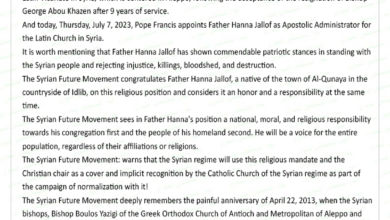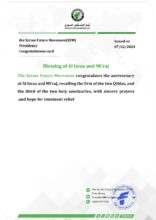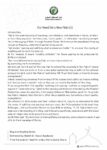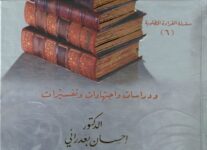15- The Constant Goal and Variable Means in the Quran: Dr. Ihssan Baadarani
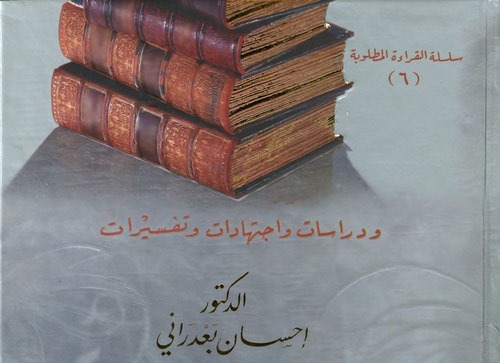
Islam is the steadfast path established by God for the happiness and well-being of humanity, around which the lives of individuals and communities revolve. The extent to which people understand and apply this path in their various life domains determines their deservedness of being described as “Muslims and believers.” This understanding and application achieve the primary divine purpose of this path, which is the welfare, happiness, and benefit of humanity.
This path, completed and perfected through the revelations to the Prophet Muhammad, in Mecca in the seventh century CE, consists entirely of constants—its words, verses, chapters, commands, and prohibitions, as well as its cosmic laws, historical and social principles, and behavioral norms. This path, or straight path, is the only religion God accepts from His servants after perfecting it, as stated: “And whoever seeks a religion other than Islam, it will never be accepted of him, and in the Hereafter, he will be among the losers” [Aal-E-Imran: 85].
Although God has given each community a path to guide their conduct and life—”To each among you, We have prescribed a law and a clear way” [Al-Ma’idah: 48]—the Quran, the primary constant in Islamic law, encompasses and confirms all previous paths in their general constants, abrogating some of their rulings as they became unsuitable due to the changing times and places. It answers profound questions that have long occupied human thought: Who am I? Where did I come from? Where am I going? What is this universe I live in? What should I do to attain happiness?
One of the most striking aspects of the Quran is its inclusion of fixed objectives, goals, and purposes, along with variable means and methods to achieve these goals and purposes. The first of these can be found in the opening chapter with the verse: “You alone we worship, and You alone we ask for help” [Al-Fatihah: 5].
In this verse, there are two interrelated and complementary concepts: worship (the goal) and seeking help (the means). Together, these form the straight path leading to human well-being and happiness as the ultimate objective of Islamic law.
Worship (knowledge) is a primary objective in the purposes of the Sharia, as evidenced by the verse: “And I did not create the jinn and humans except to worship Me” [Adh-Dhariyat: 56]. Seeking help is the means to achieve this goal.
Worship is a broad concept encompassing all of human actions and deeds, large and small, and is not limited, as some restrict it, to prayer, almsgiving, fasting, and pilgrimage. While these are forms of worship in the general sense, they are rituals and obligations in the specific sense. Honest profit in buying and selling is worship, perfecting work is worship, and fearing and revering God is worship. Therefore, God is worshiped in markets, factories, laboratories, and on school and university benches, just as He is worshiped in mosques, if not more so, because performing rituals and obligations therein is a personal matter, such as prayer, which prevents immorality and wrongdoing, and fasting, which trains one to control desires and resist temptations.
Thus, we see that worship—such as prayer and fasting—becomes a means to achieve another goal, which is to refrain from immorality and wrongdoing, and to discipline desires and resist temptations. The broader meaning of worship, however, is a general objective that extends its effects and influence to encompass the community, society, and all humanity.
A poet said:
Do not let the ascetic boast of his asceticism and worship,
For in my belief, all duties are acts of worship.
A brave man who leads a tribe with justice earns their leadership rights,
And a teacher who strives for children’s progress fulfills his duty,
And likewise, a shepherd who protects his flock from harm,
All will be rewarded by their Creator for their excellence.
God specified the goal of creation as worship in the verse [Adh-Dhariyat: 56], but when speaking about mosques, He clarified that the goal of building them is to remember God’s name: “In houses which God has permitted to be raised and wherein His name is mentioned” [An-Nur: 36], without mentioning worship because worship, meaning prayer, has become a means to achieve the worship of remembering God’s name. When we move to the verse: “When the prayer is finished, disperse through the land and seek the bounty of God” [Al-Jumu’ah: 10], we understand that dispersing through the land and seeking God’s bounty, in pursuit of sustenance, are forms of worship and means commanded by God to develop this universe where we are His successors. This is what Umar ibn Al-Khattab understood when he noticed a man always in the mosque. Upon asking about him and being told that his brother provides for him, Umar said, “His brother is more devout than him.”
What we said about the broad and inclusive meaning of worship must also be said about the meaning of seeking help, as it is an interrelated concept with worship, revolving with it wherever it goes. No worship is valid without seeking help, and worship cannot be achieved without seeking help.
If we understand this, we understand the meaning of Jacob’s words to his sons when they came to him at night, weeping after throwing Joseph into the well, claiming a wolf had eaten him: “Nay, but your minds have contrived a matter for you. So, patience is most fitting. And it is God Whose help is sought against that which you describe” [Yusuf: 18]. It means God’s help is sought with beautiful patience against what you say. We also understand the meaning of the verse: “And seek help through patience and prayer” [Al-Baqarah: 45]. Patience and prayer are acts of worship, or goals, but when we seek help through them, they become means—indicated by the preposition “through”—to achieve another goal understood from the context of the verses, which is the ability to command ourselves to righteousness as we command others to it.
The basmala (saying “In the name of God”) is a means and seeking help, indicated by the preposition “in” in the phrase “In the name of God.” Seeking refuge (saying “I seek refuge in God”) is also a means and seeking help for a purpose the one reciting the basmala or seeking refuge desires. Similarly, preparing the means of strength and power in the verse: “And prepare against them whatever you are able of power” [Al-Anfal: 60] is also a means and seeking help, the purpose of which is to prevent the enemies from thinking of aggression and practicing it.
Taking means and working according to God’s laws in the universe is also a means and seeking help. Ibn Taymiyyah said: “There is nothing in this world or the hereafter except through a cause” (Fatwas Vol. 8, p. 70). Ibn Qayyim al-Jawziyya said: “If we were to trace what proves the affirmation of causes in the Quran and Sunnah, it would exceed ten thousand places… And the greatest crime against the laws, prophecies, and monotheism is to suggest to people that monotheism is not complete without denying causes… You will not find a book greater in affirming causes than the Quran.”
We say: You will not find anyone among humans greater in affirming causes than the Messenger of God, peace be upon him. Here is a hadith from him: “Cover the vessels, tie the water skins, close the doors, and put out the lamps, for Satan does not untie a water skin, open a door, or uncover a vessel. If you cannot find anything but a stick to cover your vessel and mention God’s name, then do so. For a mouse might set the house of its inhabitants on fire” (narrated by Jabir ibn Abdullah). “Tie” means to bind, “to cover his vessel with a stick” means to cover his vessel even with a piece of wood, “mouse” is the small evil creature.
The interrelation between worship and seeking help in the opening chapter by saying: “You alone we worship, and You alone we ask for help” [Al-Fatihah: 5] is, in essence, for the contemplative readers of the Quran, an interrelation between the goal and the means, and between the result and the cause; neither can stand without the other.
Saying “You alone” in both parts of the verse means: You alone, excluding others. This necessitates knowing those others to complete the emphasis on exclusivity intended by the word “You alone.” Saying “we worship” means: We dedicate ourselves solely to obeying your commands and prohibitions in all areas of our political, cultural, and economic lives. This requires knowing what God has commanded and prohibited, distinguishing between the obligatory, recommended, and permissible in commands, and between prohibition, command, and avoidance in prohibitions. Saying “we ask for help” implies knowing the commander before knowing the command, knowing the one being sought for help, and knowing His power through His laws in the universe and within ourselves. All this knowledge is the focus of the supplication, after knowing it, in saying: “Guide us to the straight path” [Al-Fatihah: 6]. The definition of the straight path with “the” indicates that specific straight path—not any other unspecified path—that combines “we worship” and “we ask for help,” drawing the closest ways to know God’s signs in the universe and within ourselves to see with certainty that they are true and to clarify the interrelation between the goal and the means.
This interrelation in the Quran and the Sunnah between goals and means, between results and causes, is the axis around which Ibn Taymiyyah’s statement revolved, followed by his companion and student Ibn Qayyim al-Jawziyya, putting us before a significant issue: the call to abandon the jurisprudence of causes is among the greatest and most dangerous crimes against monotheism.
In the time of these two scholars, people were divided into literalists who prioritized the role of hearing and sight in acquiring knowledge, leading them into materialistic anthropomorphism, and esotericists who exaggerated in denying the role of reason in acquiring knowledge, considering the mind a veil that kills taste and prevents knowing the divine essence and dissolving into it. This led them to deny causes and to believe that unveiling and illumination through certain rituals—not through pondering and reflecting on God’s signs and cosmic laws—is the path to knowing God, i.e., worship.
Despite God creating humans from both matter and spirit, giving them a tripartite system for acquiring knowledge—hearing, sight, and hearts, as indicated in more than one place in the Quran, like: “And do not pursue that of which you have no knowledge. Indeed, the hearing, the sight, and the heart – about all those [one] will be questioned” [Al-Isra: 36]—and despite honoring in the Quran being confined to those of intellect, reason, hearts, and minds among the contemplative and reflective, who hear and see and link causes to results and means to goals, literalists and esotericists denied causes under the guise of fatalism at times and behind closed minds in dark alleys at other times. Both are severe crimes against monotheism in Ibn Qayyim al-Jawziyya’s view, as they deviate from explicit verses and their divine purposes.
Returning to the verse: “You alone we worship, and You alone we ask for help” [Al-Fatihah: 5], we find that people vary in understanding and comprehension. Some worship without seeking help, some seek help without worshiping, some neither worship nor seek help, and the best are those who combine worship and seeking help.
Those of the first type who worship without seeking help confuse reliance on God with complacency, mistakenly believing that prayer and supplication alone suffice for success in work, study, overcoming difficulties, and solving problems, unaware that material results require material means and causes.
A man asked the Prophet, peace be upon him: “O Messenger of God, should I tie my camel and rely on God?” He said: “Tie it and rely on God.” The observer of the hadith understands that reliance on God is only valid with taking the means. Similarly, we read about Umar ibn Al-Khattab when a man came to him saying: “Should I pray to God to heal my camels with mange?” Umar replied: “Yes, and make sure to treat them with tar.” Thus, we understand that supplication, incantations, and recitation of the Quran alone without appropriate medical treatment do not cure diseases, not because supplication and the Quran are without value, as detractors claim, but because they are not accompanied by taking the means.
The second type, those who seek help without worshiping, make the means an end, falling into the materialism of the universe and humanity, mistakenly believing that God’s vicegerency on earth is limited to exploiting the universe’s resources and laws for the benefit of an individual or individuals, monopolizing them and preventing others from accessing them at times, and misusing them at others, some even becoming enslaved by them.
This type of people is exemplified by Pharaoh and his courtiers, as stated: “Then We sent after them Moses with Our signs to Pharaoh and his establishment, but they were unjust toward them” [Al-A’raf: 103]. The signs in “Our signs” mean God’s cosmic and human laws, and the injustice in “they were unjust toward them” means placing them in the wrong context and corrupting the earth and society by misusing them, similar to using nuclear energy—a sign of God—for destruction instead of for the benefit of humanity in agriculture, industry, and medicine. These are the true wrongdoers and corrupters, a meaning derived from this noble verse.
The third type, those who neither worship nor seek help, are described by God: “Have you seen the one who takes his own desires as his god? Then would you be responsible for him? Or do you think that most of them hear or reason? They are but like livestock. No, they are even more astray in [their] way” [Al-Furqan: 43-44].
The fourth type, those who worship and seek help, are those who supplicate with the verse: “And of them are those who say, ‘Our Lord, give us in this world [that which is] good and in the Hereafter [that which is] good and protect us from the punishment of the Fire'” [Al-Baqarah: 201], combining well-being in this world with well-being in the Hereafter.
They follow the command: “And seek, through that which God has given you, the home of the Hereafter; but do not forget your share of the world. And do good as God has done good to you. And desire not corruption in the land. Indeed, God does not like corrupters” [Al-Qasas: 77], seeking the good of this world to achieve the good of the Hereafter.
They adhere to the verse: “Indeed, We established him upon the earth, and We gave him to everything a way [means]. So, he followed a way” [Al-Kahf: 84-85], following the necessary means to achieve the desired outcomes.
The verse “So, he followed a way” is repeated three times in Surah Al-Kahf to emphasize the necessity of taking the means, as did Dhul-Qarnayn against the corrupt Gog and Magog. God said: “He said, ‘This is a mercy from my Lord; but when the promise of my Lord comes, He will make it level, and the promise of my Lord is ever true.’ And We will leave them that day surging over each other, and [then] the Horn will be blown, and We will assemble them in [one] assembly” [Al-Kahf: 98-99].
We return to say: The means (the ships) of various kinds and the fixed goal (to seek His bounty) and His bounty, limitless in the blessings of the seas, oceans, and rivers, is merciful, and we ought to be merciful to people.
God said: “And it is He who subjected the sea for you to eat from it tender meat and to extract from it ornaments which you wear. And you see the ships plowing through it, and that you may seek of His bounty; and perhaps you will be grateful” [An-Nahl: 14]. The means (the sea) that God subjected to humanity, and the goal (to eat from it tender meat), (to extract from it ornaments which you wear), (to seek of His bounty), which is to reach the good, treasures, and wealth of the sea, without forgetting to be grateful to God, as He said: “And that there is not for man except that [good] for which he strives” [An-Najm: 39]. So where have Muslims’ efforts reached in the seas, oceans, and rivers?
God said: “Read in the name of your Lord who created; created man from a clinging substance. Read, and your Lord is the most Generous—who taught by the pen; taught man that which he knew not” [Al-‘Alaq: 1-5]. And He also said: “By the pen and what they inscribe” [Al-Qalam: 1].
Reading, the pen, the ink, and writing are means, and the goal is knowledge. The most honorable before God are the most learned, and the most learned are the most knowledgeable. Do we learn to read, or do we read to learn? Two questions need answers to understand the fixed goal from the variable means.
God said: “O children of Adam, take your adornment at every masjid, and eat and drink, but be not excessive. Indeed, He likes not those who commit excess” [Al-A’raf: 31]. Adornment is a means, eating and drinking are means too, and the goal is to take them without excess, which is one of the Quran’s constants.
God said: “And We have certainly honored the children of Adam and carried them on the land and sea and provided them with good things and preferred them over much of what We have created, with [definite] preference” [Al-Isra: 70].
Part of honoring humanity is clarifying the fixed goals in life and guiding them to the variable means in existence for their dignity, strength, honor, safety, health, continuity, and survival. The more aware humanity is of these goals and the more they take the means to achieve them, the more they are fit for this vicegerency. God said: “And for all are degrees from what they have done, and [it is] so that He may fully compensate them for their deeds, and they will not be wronged” [Al-Ahqaf: 19].
God said: “Indeed, We have made it an Arabic Quran that you might understand” [Yusuf: 2].
Finally, Muslims today have settled for superficial, literal, and phonetic recitation and beautification of the Quran’s verses, losing sight of the understanding of fixed goals and variable means, losing their witness to humanity, turning means into goals, and justifying goals with means. God said: “Then do they not reflect upon the Quran, or are there locks upon their hearts?” [Muhammad: 24]. Should we not return to understanding the constants and means in the Quran so that we may be among those deserving the description of Muslims and believers?
